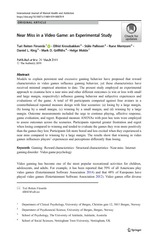Near Miss in a Video Game: an Experimental Study
Finserås, Turi Reiten; Krossbakken, Elfrid; Pallesen, Ståle; Mentzoni, Rune Aune; King, Daniel L.; Griffiths, Mark D.; Molde, Helge
Peer reviewed, Journal article
Published version

Åpne
Permanent lenke
https://hdl.handle.net/1956/23601Utgivelsesdato
2019Metadata
Vis full innførselSamlinger
Originalversjon
https://doi.org/10.1007/s11469-019-00070-9Sammendrag
Models to explain persistent and excessive gaming behavior have proposed that reward characteristics in video games influence gaming behavior, yet these characteristics have received minimal empirical attention to date. The present study employed an experimental approach to examine how a near miss and other different outcomes (a win or loss with small and large margin, respectively) influence gaming behavior and subjective experiences and evaluations of the game. A total of 40 participants competed against four avatars in a counterbalanced repeated measure design with four scenarios: (a) losing by a large margin, (b) losing by a small margin, (c) winning by a small margin, and (d) winning by a large margin. Outcome measurements included the urge to continue playing, affective response, game evaluation, and regret. Repeated measure ANOVAs with post hoc tests were employed to assess outcomes across the scenarios. Participants reported greater frustration and regret when losing compared to winning and tended to evaluate the games they won more positively than the games they lost. Participants felt more bored and less excited when they experienced a near miss compared to winning by a large margin. The results show that winning in video games influences players’ experiences and perceptions differently than losing.
